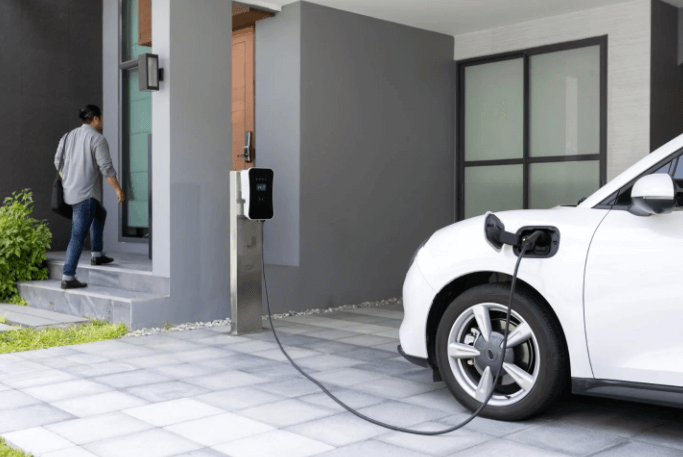The global automotive landscape is undergoing a revolutionary transformation, with electric vehicles (EVs) emerging as the frontrunners in the pursuit of sustainable mobility. Central to this paradigm shift is the integration of EV charging infrastructure, particularly at residential properties.
However, amidst the buzz surrounding EV adoption, a pertinent question looms large: Is it prohibitively expensive to install EV charging stations at home? This article embarks on a comprehensive exploration of the costs and benefits associated with home EV charging installations, aiming to demystify misconceptions and shed light on the economic feasibility of embracing electric mobility.
By delving into the intricacies of equipment costs, electrical upgrades, long-term savings, and environmental dividends, we aim to provide readers with a nuanced understanding of the financial implications and tangible advantages of investing in home EV charging solutions.
What is EV charging station?
An Electric Vehicle (EV) charging station, also known as an EV charger or electric vehicle supply equipment (EVSE), is a device used to recharge the battery of an electric vehicle. These stations provide the necessary electrical power to replenish the energy stored in the EV’s battery, allowing drivers to extend their vehicle’s range and continue their journey.
EV charging stations come in various types and configurations, catering to different charging needs and environments. The primary types of EV charging stations include:
- Level 1 Charging: Level 1 charging stations use a standard 120-volt household outlet to provide electric power to the vehicle. This type of charging is typically slower and is suitable for overnight charging at home or in locations where extended charging time is acceptable.
- Level 2 Charging: Level 2 charging stations operate on a 240-volt circuit, enabling faster charging compared to Level 1 chargers. These stations are commonly installed at homes, workplaces, public parking facilities, and commercial locations. Level 2 charging is preferred for daily charging needs and can replenish an EV’s battery more quickly, making it suitable for regular use.
- DC Fast Charging (DCFC): DC Fast Charging stations, also known as Level 3 chargers, provide the fastest charging speeds available for electric vehicles. These stations use direct current (DC) to rapidly recharge EV batteries, significantly reducing charging time compared to Level 1 and Level 2 chargers. DC Fast Charging stations are typically found along highways, major travel routes, and in urban areas where quick charging is essential for long-distance travel.
Is it very expensive to install EV charging station at home?
The electric vehicle charging station installation cost at home can vary significantly depending on several factors, including the specific requirements of your home, local regulations, and personal preferences.
While there are expenses involved, it’s essential to consider the broader context and potential long-term benefits.
Cost Factors in Installing EV Charging Stations at Home:
One of the critical components of the EV infrastructure is the availability of charging stations, both public and private. While public charging stations cater to the needs of EV owners on the go, home charging stations provide convenience and accessibility for daily charging needs.
However, the installation of EV charging stations at home involves various cost factors that need to be considered. We delve into the intricacies of these cost factors, exploring their implications and significance in the context of residential EV charging infrastructure.
Infrastructure Requirements
The first and foremost consideration in installing an EV charging station at home is the infrastructure requirements. Unlike traditional gasoline-powered vehicles, EVs require a dedicated charging point with specific electrical specifications.
Most EV owners opt for Level 2 charging stations, which operate on a 240-volt circuit, enabling faster charging compared to standard 120-volt outlets. Consequently, homeowners need to assess their electrical infrastructure’s capacity to support Level 2 charging without overloading existing circuits.
Upgrading electrical panels or circuits to accommodate the increased power demand may incur additional costs, contributing significantly to the overall installation expenses.
Charging Station Cost
The cost of the charging station itself is another pivotal factor influencing the total expenditure. The price of EV charging stations varies depending on factors such as brand, features, charging capacity, and installation complexity.
Basic Level 2 charging stations without advanced features may cost several hundred dollars, while premium models equipped with Wi-Fi connectivity, scheduling capabilities, and enhanced durability can cost upwards of a thousand dollars or more.
Homeowners must balance their budgetary constraints with their desired charging station features, opting for a solution that meets their requirements without unnecessary extravagance.
Installation Complexity
The complexity of installing an EV charging station at home can significantly impact the overall cost. Factors such as the distance between the electrical panel and the desired charging location, the need for trenching or conduit installation, and the presence of obstacles or structural challenges can all contribute to installation complexity.
In cases where significant modifications or construction work is required, such as running wiring through walls or underground, homeowners may need to enlist the services of licensed electricians or contractors, further adding to the installation expenses.
Additionally, local building codes and permitting requirements may necessitate adherence to specific guidelines, potentially increasing both time and cost.
Permitting and Regulatory Compliance
Obtaining permits and ensuring regulatory compliance are essential steps in the installation process of EV charging stations at home. Local jurisdictions often have specific regulations governing electrical installations, particularly that involving high-voltage equipment like charging stations.
Homeowners must factor in the costs associated with permit applications, inspection fees, and any required modifications to meet regulatory standards.
Failure to comply with relevant codes and regulations can result in fines, delays, and even the need for costly retrofits, underscoring the importance of thorough adherence to legal requirements.
Utility Connection and Metering
Connecting the EV charging station to the utility grid and establishing proper metering arrangements is another cost consideration. Depending on the utility provider and existing infrastructure, homeowners may incur fees for service connection, meter installation, or upgrades to accommodate the additional electrical load.
Some utilities offer special EV charging rates or incentives to encourage residential adoption, which can offset initial installation costs or provide long-term savings on electricity consumption.
Understanding the utility’s policies and exploring available incentives can help homeowners make informed decisions regarding cost-effective charging solutions.
Operational Costs
While the focus is often on upfront installation expenses, homeowners should also consider ongoing operational costs associated with EV charging. The electricity rates charged by utilities for EV charging can vary based on time-of-use pricing, demand charges, and other factors.
Optimizing charging schedules to leverage off-peak electricity rates or exploring alternative energy sources such as solar panels with battery storage can mitigate long-term operational expenses.
Additionally, maintenance costs for the charging station itself, including periodic inspections, repairs, and software updates, should be factored into the overall cost analysis.
Return on Investment (ROI)
Despite the initial investment required, installing an EV charging station at home can yield substantial long-term benefits, both economic and environmental.
Assessing the return on investment involves considering factors such as savings on fuel costs compared to gasoline vehicles, potential increases in property value, and eligibility for tax credits or incentives offered by government agencies or utility providers.
Additionally, EV owners may experience intangible benefits such as convenience, reduced emissions, and alignment with sustainability goals. Calculating the projected ROI over the expected lifespan of the EV charging station can help homeowners evaluate the cost-effectiveness of their investment and justify the initial expenditure.
Conclusion:
The installation of EV charging stations at home presents various cost factors that homeowners must carefully evaluate and manage. From infrastructure requirements and charging station costs to installation complexity and regulatory compliance, navigating these considerations requires thorough planning and informed decision-making.
By accounting for upfront expenses, ongoing operational costs, and potential returns on investment, homeowners can make sound financial choices while contributing to the widespread adoption of electric vehicles and sustainable transportation infrastructure.
As EV technology continues to evolve and regulatory frameworks adapt to emerging trends, staying informed about cost factors and industry developments remains essential for stakeholders across the residential EV charging ecosystem.











